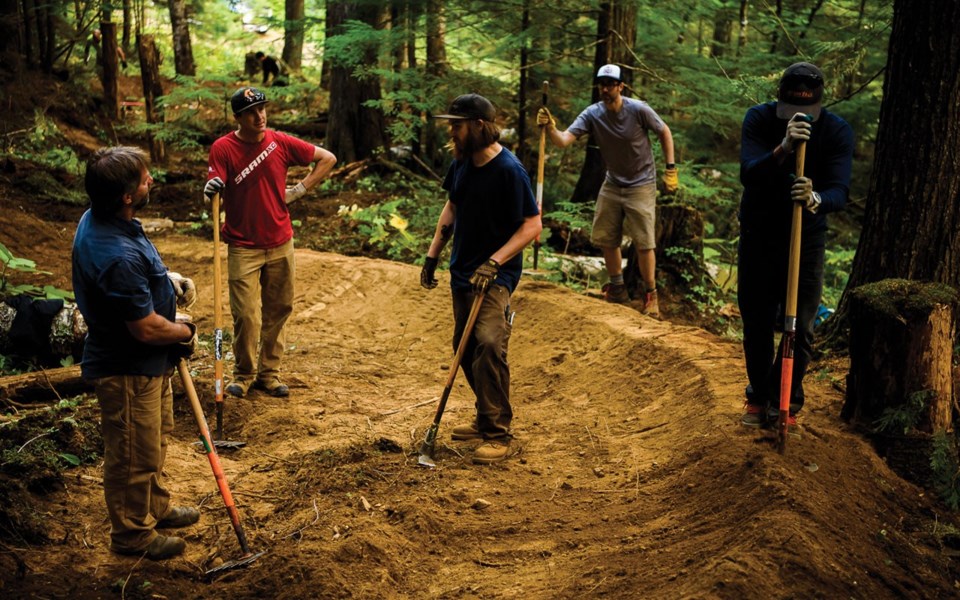As British Columbia's mountain biking trails get busier, primarily with riders who travel to access them, greater responsibilities have fallen on local organizations, many of which are volunteer-run.
But Whistler's Grant Lamont is hoping to help spearhead a movement to help clubs organize and lobby more effectively with the new, tentatively dubbed B.C. Council.
Lamont, who has served on the Mountain Biking BC board of directors for the past five years, said that organization—an offshoot of the Mountain Biking Tourism Association (MBTA)—has served its purpose well but had some blind spots in its mandate.
At the MBTA's symposium in Revelstoke last September, the wheels began to turn as several club representatives started to make the same realization that they were leaning heavily on volunteers to support booming tourist attractions.
"A lot of people were (saying), 'We got all this money for tourism. Where is the money for trails? Where is the money for the operations?'" he recalled.
Lamont noted the representatives from the provincial Recreation Sites and Trails BC organization in particular took their share of complaints from several attendees about the lack of funding, but he came to the realization that it couldn't lobby government—a separate organization was necessary.
"They give lots of money for tourism, but to back it up with operational and infrastructure dollars is always a bit of a challenge," he said.
After spearheading the initiative for the past three months, MBTA executive director Martin Littlejohn sent an email on May 7 inviting previous symposium attendees to a meeting on June 1 at Whistler Museum. In less than a day, over 50 said they planned to attend. The diverse group includes not only industry representatives, but also government and First Nations stakeholders from all over the province.
"We're going to really, really focus on some key issues, which are things like trail access and mountain biking in general," he said. "We're not going to be worrying about tourism."
In addition to Recreation Sites and Trails and the MBTA, the International Mountain Bicycling Association (IMBA)'s Canadian chapter will also be represented. IMBA Canada helped start assembling the B.C. Council to focus on provincial issues.
"What we're going to do is present the state of the B.C. Council, and where it's at right now," Lamont said. "What we're going to do is build the framework and the mandate for the organization at this meeting."
Lamont said one of the keys is to include First Nations from the outset as the group tackles issues like land use, risk management and liability, trail inspections, and access.
"It's going to be focused on how trails get built, how people use them, how they get signed," he said, adding all the decisions and plans will work as resources for clubs and builders across the province.
Littlejohn, meanwhile, stressed it is important for the organization to form in order to hit the important points that fall outside the tourism organization's jurisdiction.
"A tourism association needs to work hand in hand with this organization, with the advocacy group. Some of the issues are common to both, but the tourism side is commercially focused whereas the advocacy side is about public recreation," he said. "It makes sense to have those mandates handled by different organizations."
Anyone interested in the BC Council but unable to attend is encouraged to contact chairperson Jay Darby at jay.darby@imbacanada.com.
The meeting will come as part of Lamont's ThinkBike weekend, which is evolving this year. Originally part of Utah-based Outerbike, Lamont declared independence and rebranded for 2017. For 2018, he's planning to shift away from "riding as many demo bikes as possible" to focusing more on exploration and the love of riding.
"Over the winter, we had a big re-think about our motivations for doing this," he said. "We want to turn it into more of a gathering, which is really going to focus on the guided rides and providing great hospitality.
"We're still going to have demos available, but we're really changing the emphasis of taking group sizes from 10 down to five to make sure people can do it."
Lamont noted Arbutus Routes and Bear Back Biking would help his Whistler Trail Solutions outfit with guiding,
Lamont expects between 250 and 300 attendees, which should be helped by a new pass option that will offer discounts to those bringing their own bikes.




